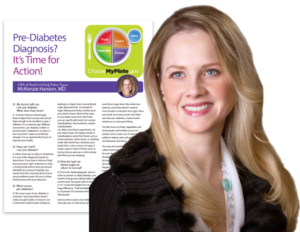Diabetes is a chronic disease that, although serious, can be managed with diligent care and maintenance.
At Yankton Medical Clinic, P.C., both Susan Fanta, M.D., and Martha Holstein, M.D., have extensive backgrounds working with diabetic patients. Dr. Fanta is board certified in internal medicine and has worked with diabetic patients for 30 years, while Dr. Holstein is board certified in pediatrics and practices internal medicine, which allows her to follow diabetic cases from childhood to adulthood.
In general, childhood onset diabetes is type I and adult onset diabetes is type 2. There are many exceptions to this generalization. These are the most common types, but some other types of diabetes can rarely occur. Type 1 diabetes requires insulin treatment immediately while type 2 diabetes may not until the disease progresses.
Risk factors for type 2, or adult onset, diabetes are a family history of the disease and being overweight or obese. Even if there is no family history of diabetes, having an elevated body mass index (BMI) is a risk factor.
According to Dr. Holstein, some warning signs of diabetes can be increased thirst or dry mouth and increased urination or unintended weight loss. In addition, some people will have new blurred or changed vision or increased fatigue.
“If you think you might be at risk, your physician or provider can review your symptoms, lifestyle, past medical and family history and help guide appropriate testing,” Dr. Holstein said.
Pre-Diabetes Diagnosis?
|
 |
Dr. Fanta explained further. “We may do a blood test, and if your blood sugar is greater than 126 with a 12-hour fast and the hemoglobin AIC value is greater than 6.5, we can be suspicious that diabetes might be present.”
In general, a healthy, varied diet, regular exercise and maintaining a healthy weight is the foundation for diabetes management. Other things you can do are:
- Care for other chronic illnesses like high blood pressure, take appropriate medications and have regular health care visits, including dentist, optometrist and medical providers, to catch complications early.
- Eat a variety of fruits, vegetables, lean meats and other whole foods. Eat less processed foods, getting carbohydrates from natural sources found in fruits and vegetables.
- Allow for foods you enjoy. Treats in moderation are okay.
- When eating something that is high in carbohydrate or sugar, pair it with a protein or healthy fat to slow digestion and reduce a spike in blood sugar.
- Aim for small exercise goals and build on your achievements. Doing something you enjoy will ensure you stick with your plan.
- Always take your medications as directed and let your doctor know if your body doesn’t tolerate it—adjustments can be made.
Some patients lose sensation in their feet as the disease progresses, putting them at risk for infections. Be sure to:
- Inspect feet regularly to look for injury.
- Keep feet moisturized and wear hard–soled shoes to protect them.
- Be careful when trimming nails.
And, of course, regularly-scheduled visits at every 6-12 months are integral to help catch complications early. At these visits, many things are assessed, including blood pressure, lipids and blood sugar management.
“We want to manage blood sugar, but also the vascular system – blood pressure, cholesterol and other risk factors, such as smoking,” said Dr. Fanta. “We have a lot of newer advances we can offer diabetics now; as well as new medicines that seem to be very effective in managing the whole picture of diabetes, not only blood sugar, but also cardiovascular risk. It is such an important feature that we make sure to manage it at any visit that we can.”
“We have a lot of newer advances we can offer diabetics now; as well as new medicines that seem to be very effective in managing the whole picture of diabetes, not only blood sugar, but also cardiovascular risk.”
“The same lifestyle recommendations for managing diabetes can help those at higher risk prevent or delay time to onset of diabetes,” Dr. Holstein said. “It’s important to know that we cannot always control if we get diabetes or other illnesses, but we can try our best to care for our bodies for the best chance of a healthy life. Don’t blame yourself for your illnesses, but be proactive about caring for the illnesses you have.”
A new diagnosis of diabetes can be overwhelming. A diabetes educator can help guide you as you learn more about how to manage this condition. Your health care team made up of your provider, nurse, pharmacist and diabetes educator are all available to answer your questions along the way.
Dr. Holstein added, “While diabetes is a challenging illness, we are here to meet you where you are in your journey and help you achieve your health goals.”

